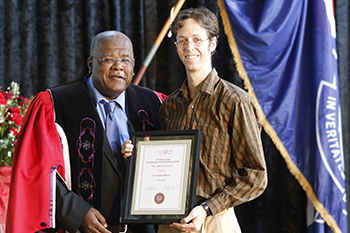Latest News Archive
Please select Category, Year, and then Month to display items
01 February 2024
|
Story Lacea Loader
|
Photo SUPPLIED
 Prof Prince Ngobeni, newly appointed Campus Principal of the UFS Qwaqwa Campus.
Prof Prince Ngobeni, newly appointed Campus Principal of the UFS Qwaqwa Campus.
The University of the Free State (UFS) has appointed Prof Prince Ngobeni as Principal of the Qwaqwa Campus as from 1 February 2024.
Prof Ngobeni completed his first qualification in Analytical Chemistry at the then Technikon North-West before furthering his studies at the then Technikon Pretoria. He completed a DTech in Chemistry at the Tshwane University of Technology (TUT) in 2003. In 2016, he enrolled for a Doctor of Business Administration in Higher Education at the University of Bath in England.
His lecturing career began at TUT in 1995 where he progressed from Head of Department: Chemistry in 2003 to Associate Dean: Faculty of Science in 2010, before being appointed as Executive Dean of the Faculty of Sciences at TUT in 2015 – a position he held until 2023. He also served as Interim Campus Rector of TUT’s Pretoria Campus from 2018 to 2020.
“With extensive years of academic leadership experience, Prof Ngobeni has the experience required to guide the Qwaqwa Campus towards the university’s Vision 130. The campus is already recognised as a leader in some of its unique research fields, and Prof Ngobeni’s strong research background will be valuable in this regard,” says Prof Francis Petersen, Vice-Chancellor and Principal of the UFS.
Prof Ngobeni is a member of several professional bodies in his field of expertise, including MatTEK at the Council for Scientific and Industrial Research (CSIR), the South African Chemical Institute (SACI), the Society for Atomic Spectroscopy, and the South African Council for Natural Scientific Professions (SACNASP). During his career, he has also secured research funding for individual projects and international partnerships. Prof Ngobeni also initiated chemistry practical sessions for local schools and participated in the Technology Station in Chemicals project, which offers a wide range of services designed to assist small and medium enterprises (SMEs) in the chemical sector.
His substantial list of publications in journals and books covers a range of chemistry-related and managerial topics. He is also a well-versed presenter at local and international conferences.
“The Qwaqwa Campus has experienced major developments in recent years; I look forward to further contributing to the growth of the campus and to support the university in achieving its Vision 130,” says Prof Ngobeni.
Book Prize for Distinguished Scholarship awarded to Dr Christian Williams
2016-03-24

Prof Jonathan Jansen, Vice-Chancellor and Rector of the University of the Free State and Dr Christian Williams, senior lecturer at the UFS Department of Anthropology.
Photo: Johan Roux |
When Dr Christian Williams moved from the United States to Namibia in January 2000 as part of the WorldTeach volunteer programme for teachers, he had not anticipated an award-winning piece of scholarship in his future. It was during these visits to Namibia, though, that the seeds for his highly-acclaimed book were sewn.
While volunteering at the St. Therese Secondary School in Tses at that time, Dr Williams – now a senior lecturer at the University of the Free State (UFS) Department of Anthropology – became acquainted with some of the school’s alumni. The stories these individuals started sharing with him soon revealed personal histories of exile and violence by fellow SWAPO (South West Africa People’s Organization) members.
These experiences ultimately resulted in Dr Williams’ book, National liberation in postcolonial southern Africa: a historical ethnography of SWAPO’s exile camps, published last year. Due to the book’s literary impact, the university awarded Dr Williams the UFS Book Prize for Distinguished Scholarship on Friday 19 February 2016. Dr Williams is the second academic to be awarded this prize.
Politics of the past
In the 1960s, Namibians mobilised and retaliated against colonial rule under the liberation movement known as SWAPO. This created political tension which resulted in the flight of many SWAPO members to exile camps administered by the party.
“Over its three decades in exile, SWAPO was responsible for the welfare of roughly 60 000 Namibians. This was about 4% of the total Namibian population at independence – most of whom lived in camps,” says Dr Williams. The research originally used as a basis for his doctoral thesis was subsequently developed into this prize-winning book.
Advancing the Human Project
“It’s an honour to receive recognition from the university; it means that they value the kind of work that I am doing. I think it’s great for universities to have such prizes,” Dr Williams says.
Supporting the UFS Human Project, Dr Williams will donate a portion of the R25 000 prize money towards the UFS Student Bursary Fund Campaign, as well as the school in Namibia.The rest will subsidise the purchase of the book for distribution to libraries and as gifts.